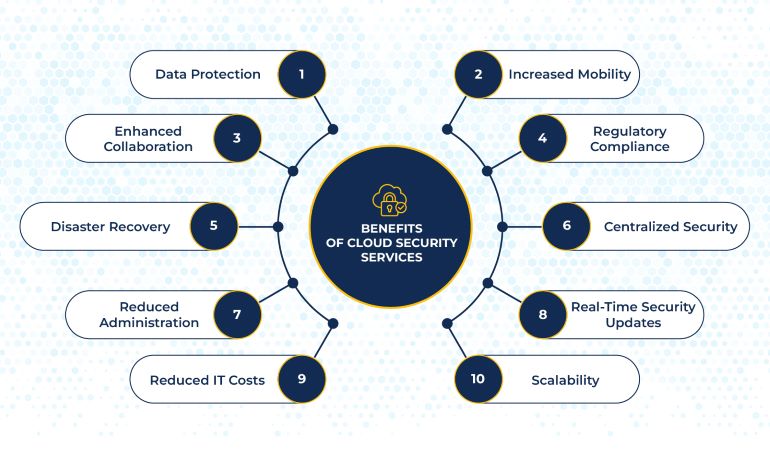In cloud computing, security is essential in protecting the integrity, confidentiality, risk management for clouds, and data availability within the digital world. It encompasses significant controls, policy formulation, development of procedures, and deployment of various technologies to protect the infrastructure and systems of the cloud.
Let’s discuss the technical aspects of managed cloud security services benefits further, including more details in the rest of this blog post.
Top Benefits of Cloud Security Services
Here are the top benefits of choosing cloud security services for enterprises;

-
Data Protection
First, we have data protection in the list of cloud security services benefits. Any good team has some critical goals within it, including securing data. In fact, Securing the tremendous volumes of data that the cloud processes and houses is the priority for it, in fact. There are numerous tools and tactics applied toward solid data protection within a cloud environment.
Data encryption is the topmost tool in our set, which transforms data into an unreadable format that can be decoded only with the relevant key. Thus, even in cases of data breaches, such intercepted data remains out of bounds for unauthorized users.
Another important tool is Identity and Access Management, which allows access to data only to those authorized personnel. Techniques include two-factor authentication, complex passwords, and strict access controls, forming an effective IAM strategy.
The second is a regular security audit to find possible vulnerabilities within the cloud infrastructure. This will aid in anticipating problems and reinforcing data protection strategies.
-
Regulatory Compliance
Regulatory compliance is the second cloud security benefit on the list. For the healthcare and finance sectors, strict adherence to regulatory demands for data protection is crucial. Mechanisms within cloud security help organizations meet these requirements effectively.
Encryption and tokenization can be used to comply with data protection policies, while access control can be met with the use of strong IAM policies. Also, many cloud providers have built-in settings to comply with regulatory requirements like GDPR and HIPAA.
-
Reduced IT Cost
Implementing cloud security can substantially reduce an organization’s IT expenditures. This reduction is achieved by several factors. First and foremost, an organization has the capability to reduce capital spending on hardware and its support.
Cloud security service providers are also known to have numerous security resources. One of which is the team of professional experts dedicated to working there. Thus, the organizations are able to utilize such resources rather than investing heavily in developing their capabilities in-house.
Adding security to the cloud may further make compliance easier, thereby reducing cost and complexity along with lower total IT costs.
-
Scalability
Cloud security management displays wonderful scalability. Like changing goals and objectives in an evolving business, security requirements also change over time. In traditional systems, scalability is a bit of a marathon – slow and expensive. But with the cloud, security can be scaled at the same speed as your business grows.
This scalability is possible because the actual hard work of handling infrastructure lies with the CSPs. As an organization’s data or usage balloons, it’s time for the CSP to pull in more resources with complete security.
-
Disaster Recovery
Cloud security is proving to be an indispensable ally, playing a pivotal role in disaster recovery and business continuity planning. Traditional recovery methods tend to burn holes in pockets and get quite tangled in themselves, requiring extra physical storage spaces. However, cloud security swings in with data backed up to the cloud, accessible, and recoverable from any corner of the world.
Cloud security services providers often pull off quite a trick with regard to data replication across different kinds of regions, making disaster recovery processes that much more resilient. As this data nestles cozily in the cloud, protection is provided all the time during the backup and recoveries.
-
Centralized Security
Cloud security is almost like a central command that offers centralized security to its advantage. A normal system involves a series of scattering by most organizations across different locales and devices that handle data and applications. This scattering can prove a little pickle when dealing with the security issue, thus providing space for breaches.
However, cloud security best practices, like those of an experienced team leader, centralize defense mechanisms. This simplifies the task of managing security and provides a bird’s-eye view of the security standing. All data and applications are safely placed under that one security umbrella. It minimizes breach points, makes monitoring easy, and enables swift cloud threat detection.
-
Reduced Administration
Cloud security substantially decreases administrative overheads relating to security management. In general IT settings, in-house IT teams typically bear the cost and efforts of conducting security management and maintenance, which usually involves enormous time and human resource costs.
Managed Cloud security simplifies this. The cloud security services provider automates and handles several administrative activities, such as patching, auditing, and updates. This reduces the burden on the IT teams, focusing on strategic, high-value tasks rather than drowning in security maintenance.
-
Real-Time Security Updates
One should remain aware of the latest security practices in this rapidly evolving world of cyber threats. A key advantage of cloud security is real-time updates for security practices. The moment threats arise, the cloud service provider is able to roll out instantaneous updates and patches all around the cloud infrastructure.
This is quite different from traditional security implementations, where updates are installed manually and can sometimes be late or inconsistent. With managed cloud security, the organization is guaranteed that it always has the latest and strongest security defenses.
-
Enhanced Collaboration
Cloud security promotes a secure environment that greatly enhances teamwork among members. All-inclusive cloud security and hybrid cloud security enable authorized users to share safely and access data and applications from anywhere.
Access controls are quite strict, and encrypted sharing protocols promote it and maintain the sanctity and confidentiality of data in any joint venture. It can bring about dramatic efficiency and contribute towards organizational innovation.
-
Increased Mobility
Cloud security offers a solid basis for secure remote access, which increases flexibility. Data and applications stored in the cloud can be safely accessed from anywhere, on any device, with strong access controls, and with encryption.
This flexibility particularly supports remote teams and encourages business continuity in unexpected situations, though increased access is guaranteed to be accompanied by careful security measures in the cloud designed to minimize data breach risk.
Conclusion
Before finalizing this discussion, a crucial point needs to be emphasized, like moving to cloud technology, which represents both significant advantages and specific security challenges for organizations. Organizations must adopt robust cloud security measures and best practices at the top of the list when migrating into the cloud, protecting data, compliance, scalability solutions, and cost-cutting IT expenses, among many other compelling advantages of the shift. Cloud Security Benefits really come in at this step.
It may seem impossible to run an obstacle course to get through cloud security Compliance. Skills and tools have to be applied to avoid such obstructions. Where Xavor shines is its all-around cloud security services, enabling organizations to navigate complex landscapes within the clouds more fluidly while still minimizing risk and allowing focus on more critical business operations.
If you need further help, you can contact us at [email protected]. We will schedule a free consultation session to explore how Xavor can assist you in this matter.

